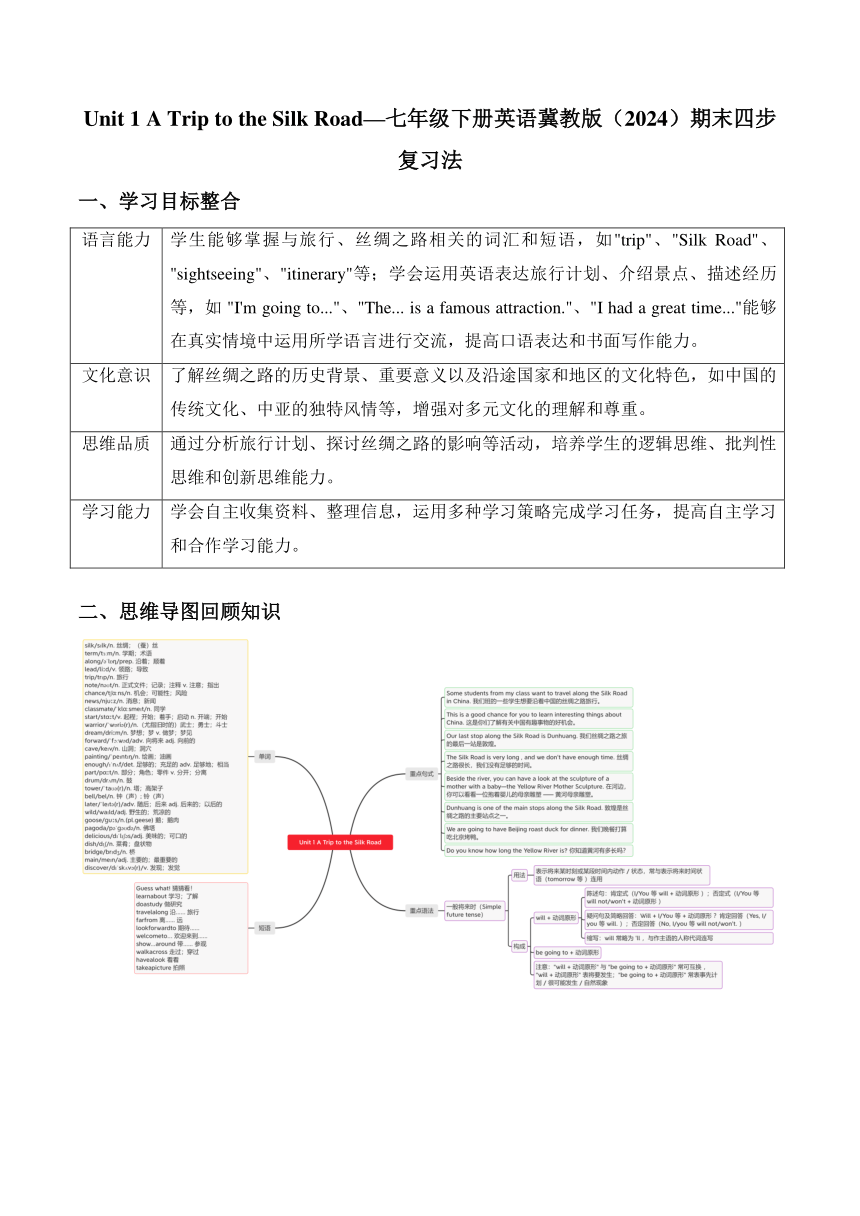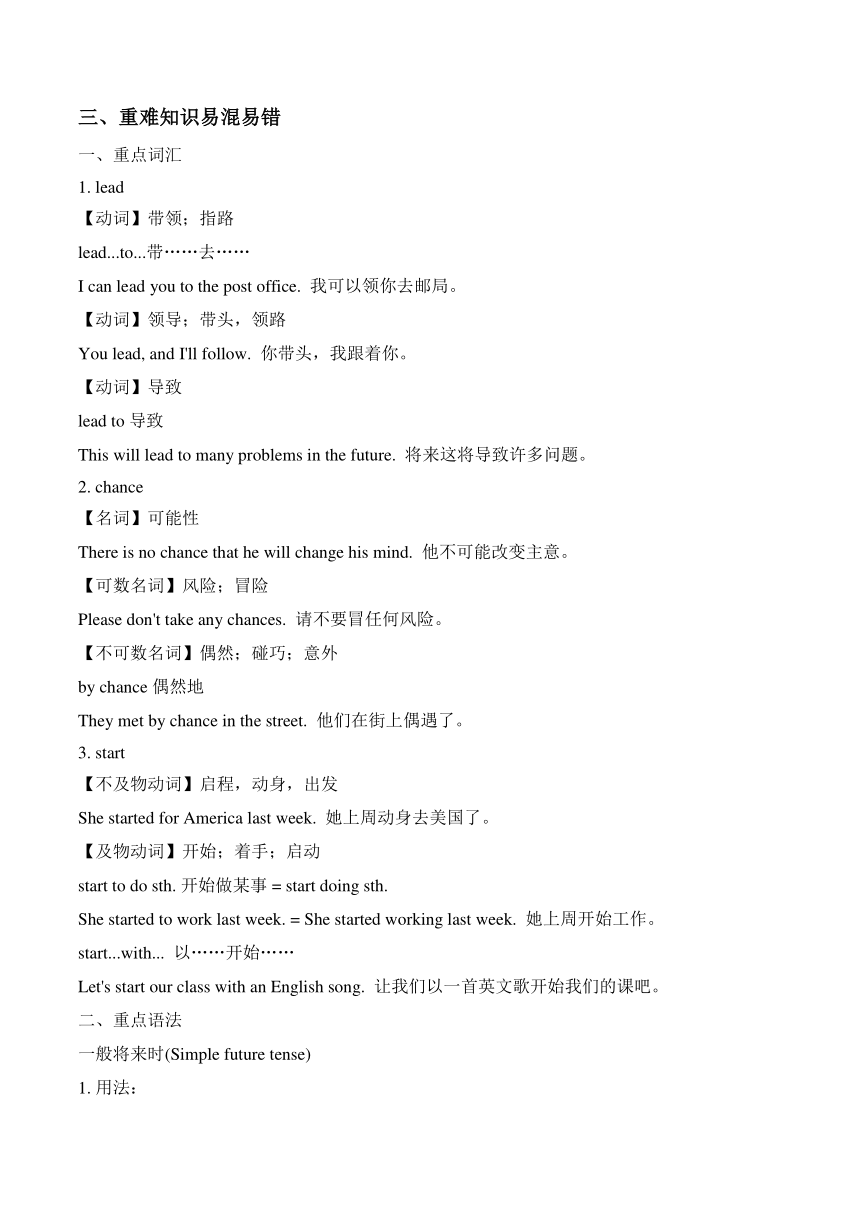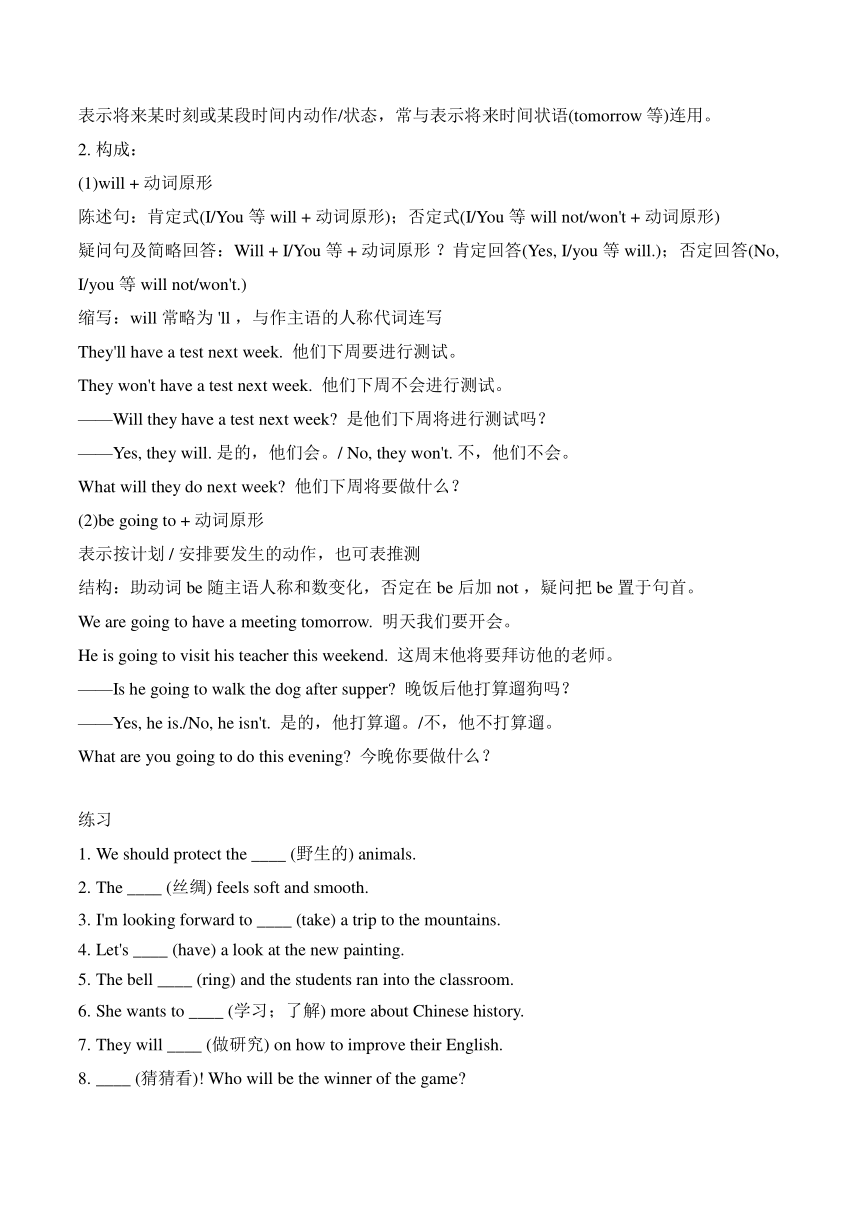Unit 1 A Trip to the Silk Road 冀教版(2024)七年级下册期末四步复习法(含答案)
文档属性
| 名称 | Unit 1 A Trip to the Silk Road 冀教版(2024)七年级下册期末四步复习法(含答案) |  | |
| 格式 | docx | ||
| 文件大小 | 5.8MB | ||
| 资源类型 | 教案 | ||
| 版本资源 | 冀教版 | ||
| 科目 | 英语 | ||
| 更新时间 | 2025-05-29 09:51:17 | ||
图片预览



文档简介
Unit 1 A Trip to the Silk Road—七年级下册英语冀教版(2024)期末四步复习法
一、学习目标整合
语言能力 学生能够掌握与旅行、丝绸之路相关的词汇和短语,如"trip"、"Silk Road"、"sightseeing"、"itinerary"等;学会运用英语表达旅行计划、介绍景点、描述经历等,如 "I'm going to..."、"The... is a famous attraction."、"I had a great time..."能够在真实情境中运用所学语言进行交流,提高口语表达和书面写作能力。
文化意识 了解丝绸之路的历史背景、重要意义以及沿途国家和地区的文化特色,如中国的传统文化、中亚的独特风情等,增强对多元文化的理解和尊重。
思维品质 通过分析旅行计划、探讨丝绸之路的影响等活动,培养学生的逻辑思维、批判性思维和创新思维能力。
学习能力 学会自主收集资料、整理信息,运用多种学习策略完成学习任务,提高自主学习和合作学习能力。
二、思维导图回顾知识
三、重难知识易混易错
一、重点词汇
1. lead
【动词】带领;指路
lead...to...带……去……
I can lead you to the post office. 我可以领你去邮局。
【动词】领导;带头,领路
You lead, and I'll follow. 你带头,我跟着你。
【动词】导致
lead to 导致
This will lead to many problems in the future. 将来这将导致许多问题。
2. chance
【名词】可能性
There is no chance that he will change his mind. 他不可能改变主意。
【可数名词】风险;冒险
Please don't take any chances. 请不要冒任何风险。
【不可数名词】偶然;碰巧;意外
by chance 偶然地
They met by chance in the street. 他们在街上偶遇了。
3. start
【不及物动词】启程,动身,出发
She started for America last week. 她上周动身去美国了。
【及物动词】开始;着手;启动
start to do sth. 开始做某事 = start doing sth.
She started to work last week. = She started working last week. 她上周开始工作。
start...with... 以……开始……
Let's start our class with an English song. 让我们以一首英文歌开始我们的课吧。
二、重点语法
一般将来时(Simple future tense)
1. 用法:
表示将来某时刻或某段时间内动作/状态,常与表示将来时间状语(tomorrow等)连用。
2. 构成:
(1)will + 动词原形
陈述句:肯定式(I/You 等 will + 动词原形);否定式(I/You 等 will not/won't + 动词原形)
疑问句及简略回答:Will + I/You 等 + 动词原形 ?肯定回答(Yes, I/you 等 will.);否定回答(No, I/you 等 will not/won't.)
缩写:will 常略为 'll ,与作主语的人称代词连写
They'll have a test next week. 他们下周要进行测试。
They won't have a test next week. 他们下周不会进行测试。
——Will they have a test next week 是他们下周将进行测试吗?
——Yes, they will. 是的,他们会。/ No, they won't. 不,他们不会。
What will they do next week 他们下周将要做什么?
(2)be going to + 动词原形
表示按计划 / 安排要发生的动作,也可表推测
结构:助动词 be 随主语人称和数变化,否定在 be 后加 not ,疑问把 be 置于句首。
We are going to have a meeting tomorrow. 明天我们要开会。
He is going to visit his teacher this weekend. 这周末他将要拜访他的老师。
——Is he going to walk the dog after supper 晚饭后他打算遛狗吗?
——Yes, he is./No, he isn't. 是的,他打算遛。/不,他不打算遛。
What are you going to do this evening 今晚你要做什么?
练习
We should protect the ____ (野生的) animals.
The ____ (丝绸) feels soft and smooth.
I'm looking forward to ____ (take) a trip to the mountains.
Let's ____ (have) a look at the new painting.
The bell ____ (ring) and the students ran into the classroom.
She wants to ____ (学习;了解) more about Chinese history.
They will ____ (做研究) on how to improve their English.
____ (猜猜看)! Who will be the winner of the game
答案
答案:wild
解析:"野生的"对应的英文单词是"wild",用来修饰后面的名词"animals"。
答案:silk
解析:"丝绸"的英文是"silk",作句子的主语,"silk"是不可数名词,所以用原形。
答案:taking
解析:"look forward to"是固定短语,意为"期待",其中"to"是介词,后面接动词-ing形式,所以"take"要变为"taking"。
答案:have
解析:"let's"是"let us"的缩写,"let sb. do sth."是固定用法,意思是"让某人做某事",所以这里用动词原形"have"。
答案:rang
解析:根据后面的"ran"可知句子时态是一般过去时,"ring"的过去式是"rang",表示"铃响了"。
答案:learn about
解析:"want to do sth."是固定结构,意为"想要做某事","学习;了解"对应的英文短语是"learn about",所以这里用原形。
答案:do a study
解析:"will"是一般将来时的助动词,后面接动词原形,"做研究"对应的英文短语是"do a study"。
答案:Guess what
解析:"猜猜看"对应的英文短语是"Guess what",位于句首,首字母大写。
四、核心素养对接中考
一、阅读理解
BONJOUR (hello) ! Welcome to France! It is the biggest country in Western Europe. Paris, the city of light, is its capital.
France is famous for fine art. Auguste Rodin (奥古斯特.罗丹) and Claude Monet (克劳德.莫奈) are great French artists. You can see some of their works in the world's best-known museum, the Louvre in Paris. Today if you visit France, you can still feel artistic everywhere. It's easy to meet street artists in the center of the city or you may meet a singer in the subway.
Transportation in France is also well known. It made many advanced (先进的) airplanes, including the A380. It is the largest passenger airplane in the world. It can hold about 500 people. A normal plane can hold 100 to 300 people.
But the country is not perfect. Pick-pocketing (偷窃) happens a lot in Paris. They steal tourists' money and bags. Many Chinese visitors feel unhappy about it.
1.France is the largest country in ________.
A. Europe B. Asia
C. Western Europe D. Southern America
2.What is France well-known for
A. Fine art and delicious food. B. Pick-pocketing.
C. Transportation and fine art. D. Back-packing.
3.What can you probably see in France
A. Auguste Rodin. B. The Louvre Museum.
C. Claude Monet. D. The Leaning Tower.
4.Why does the author think France is not perfect
A. Because there are too many visitors.
B. Because there are too many airplanes.
C. Because there are too many thieves.
D. Because there are too many street artists.
二、情景交际
A: Excuse me, where's the Forest Park
B: Sorry, I'm new here. You can ask that old man.
A:① ________
B: You're welcome.
A: ②_______
C: Go along this street. Then turn left at the second turning. It's on your left.
A: ③_______
C: It's about thirty minutes on foot.
A: Can I take a bus
C: Of course, you can.
A: ④________
C: The No. 51 bus.
A: Where is the bus stop
C: It's on the other side of the street.
A: Thank you very much.
C: ⑤_______ Best wishes!
A. How long is it
B. Which bus can I take
C. Excuse me, could you tell me the way to the Forest Park
D. That's right.
E. Thank you all the same.
F. That's all right.
G. How far is it from here
答案
一、阅读理解
1.答案:C
解析:细节理解题。根据第一段"Welcome to France! It is the biggest country in Western Europe"可知,法国是西欧最大的国家。故选C。
2.答案:C
解析:推理判断题。根据第二段"France is famous for fine art"法国以美术闻名;第三段"Transportation in France is also well known"法国的交通也很有名;可知,法国以交通和美术闻名。故选C。
3.答案:B
解析:推理判断题。根据第二段"You can see some of their works in the world's best-known museum, the Louvre in Paris."可以在巴黎卢浮宫看到他们的一些作品;可知,在法国有可能会看到卢浮宫博物馆。故选B。
4.答案:C
解析:推理判断题。根据第四段"But the country is not perfect. Pick-pocketing happens a lot in Paris."这个国家并不完美,扒窃在巴黎经常发生;可知,法国不完美因为小偷太多了。故选C。
二、情景交际
答案:①-⑤ ECGBF
解析:本文是A询问去森林公园的一则对话。
①根据"You're welcome"可知,此处应表示感谢,E选项"仍然感谢你"符合,故选E。
②根据"Go along this street. Then turn left at the second turning. It's on your left."可知,询问去往某个地方的路线,C选项"劳驾,你能告诉我去森林公园的路吗"符合,故选C。
③根据"It's about thirty minutes on foot"可知,询问距离有多远,G选项"离这里有多远"符合,故选G。
④根据"The No. 51 bus"可知,询问要乘坐哪一辆巴士,B选项"我可以乘哪路车"符合,故选B。
⑤根据"Thank you very much."可知,应回答"不客气",F选项"不客气"符合,故选F。
一、学习目标整合
语言能力 学生能够掌握与旅行、丝绸之路相关的词汇和短语,如"trip"、"Silk Road"、"sightseeing"、"itinerary"等;学会运用英语表达旅行计划、介绍景点、描述经历等,如 "I'm going to..."、"The... is a famous attraction."、"I had a great time..."能够在真实情境中运用所学语言进行交流,提高口语表达和书面写作能力。
文化意识 了解丝绸之路的历史背景、重要意义以及沿途国家和地区的文化特色,如中国的传统文化、中亚的独特风情等,增强对多元文化的理解和尊重。
思维品质 通过分析旅行计划、探讨丝绸之路的影响等活动,培养学生的逻辑思维、批判性思维和创新思维能力。
学习能力 学会自主收集资料、整理信息,运用多种学习策略完成学习任务,提高自主学习和合作学习能力。
二、思维导图回顾知识
三、重难知识易混易错
一、重点词汇
1. lead
【动词】带领;指路
lead...to...带……去……
I can lead you to the post office. 我可以领你去邮局。
【动词】领导;带头,领路
You lead, and I'll follow. 你带头,我跟着你。
【动词】导致
lead to 导致
This will lead to many problems in the future. 将来这将导致许多问题。
2. chance
【名词】可能性
There is no chance that he will change his mind. 他不可能改变主意。
【可数名词】风险;冒险
Please don't take any chances. 请不要冒任何风险。
【不可数名词】偶然;碰巧;意外
by chance 偶然地
They met by chance in the street. 他们在街上偶遇了。
3. start
【不及物动词】启程,动身,出发
She started for America last week. 她上周动身去美国了。
【及物动词】开始;着手;启动
start to do sth. 开始做某事 = start doing sth.
She started to work last week. = She started working last week. 她上周开始工作。
start...with... 以……开始……
Let's start our class with an English song. 让我们以一首英文歌开始我们的课吧。
二、重点语法
一般将来时(Simple future tense)
1. 用法:
表示将来某时刻或某段时间内动作/状态,常与表示将来时间状语(tomorrow等)连用。
2. 构成:
(1)will + 动词原形
陈述句:肯定式(I/You 等 will + 动词原形);否定式(I/You 等 will not/won't + 动词原形)
疑问句及简略回答:Will + I/You 等 + 动词原形 ?肯定回答(Yes, I/you 等 will.);否定回答(No, I/you 等 will not/won't.)
缩写:will 常略为 'll ,与作主语的人称代词连写
They'll have a test next week. 他们下周要进行测试。
They won't have a test next week. 他们下周不会进行测试。
——Will they have a test next week 是他们下周将进行测试吗?
——Yes, they will. 是的,他们会。/ No, they won't. 不,他们不会。
What will they do next week 他们下周将要做什么?
(2)be going to + 动词原形
表示按计划 / 安排要发生的动作,也可表推测
结构:助动词 be 随主语人称和数变化,否定在 be 后加 not ,疑问把 be 置于句首。
We are going to have a meeting tomorrow. 明天我们要开会。
He is going to visit his teacher this weekend. 这周末他将要拜访他的老师。
——Is he going to walk the dog after supper 晚饭后他打算遛狗吗?
——Yes, he is./No, he isn't. 是的,他打算遛。/不,他不打算遛。
What are you going to do this evening 今晚你要做什么?
练习
We should protect the ____ (野生的) animals.
The ____ (丝绸) feels soft and smooth.
I'm looking forward to ____ (take) a trip to the mountains.
Let's ____ (have) a look at the new painting.
The bell ____ (ring) and the students ran into the classroom.
She wants to ____ (学习;了解) more about Chinese history.
They will ____ (做研究) on how to improve their English.
____ (猜猜看)! Who will be the winner of the game
答案
答案:wild
解析:"野生的"对应的英文单词是"wild",用来修饰后面的名词"animals"。
答案:silk
解析:"丝绸"的英文是"silk",作句子的主语,"silk"是不可数名词,所以用原形。
答案:taking
解析:"look forward to"是固定短语,意为"期待",其中"to"是介词,后面接动词-ing形式,所以"take"要变为"taking"。
答案:have
解析:"let's"是"let us"的缩写,"let sb. do sth."是固定用法,意思是"让某人做某事",所以这里用动词原形"have"。
答案:rang
解析:根据后面的"ran"可知句子时态是一般过去时,"ring"的过去式是"rang",表示"铃响了"。
答案:learn about
解析:"want to do sth."是固定结构,意为"想要做某事","学习;了解"对应的英文短语是"learn about",所以这里用原形。
答案:do a study
解析:"will"是一般将来时的助动词,后面接动词原形,"做研究"对应的英文短语是"do a study"。
答案:Guess what
解析:"猜猜看"对应的英文短语是"Guess what",位于句首,首字母大写。
四、核心素养对接中考
一、阅读理解
BONJOUR (hello) ! Welcome to France! It is the biggest country in Western Europe. Paris, the city of light, is its capital.
France is famous for fine art. Auguste Rodin (奥古斯特.罗丹) and Claude Monet (克劳德.莫奈) are great French artists. You can see some of their works in the world's best-known museum, the Louvre in Paris. Today if you visit France, you can still feel artistic everywhere. It's easy to meet street artists in the center of the city or you may meet a singer in the subway.
Transportation in France is also well known. It made many advanced (先进的) airplanes, including the A380. It is the largest passenger airplane in the world. It can hold about 500 people. A normal plane can hold 100 to 300 people.
But the country is not perfect. Pick-pocketing (偷窃) happens a lot in Paris. They steal tourists' money and bags. Many Chinese visitors feel unhappy about it.
1.France is the largest country in ________.
A. Europe B. Asia
C. Western Europe D. Southern America
2.What is France well-known for
A. Fine art and delicious food. B. Pick-pocketing.
C. Transportation and fine art. D. Back-packing.
3.What can you probably see in France
A. Auguste Rodin. B. The Louvre Museum.
C. Claude Monet. D. The Leaning Tower.
4.Why does the author think France is not perfect
A. Because there are too many visitors.
B. Because there are too many airplanes.
C. Because there are too many thieves.
D. Because there are too many street artists.
二、情景交际
A: Excuse me, where's the Forest Park
B: Sorry, I'm new here. You can ask that old man.
A:① ________
B: You're welcome.
A: ②_______
C: Go along this street. Then turn left at the second turning. It's on your left.
A: ③_______
C: It's about thirty minutes on foot.
A: Can I take a bus
C: Of course, you can.
A: ④________
C: The No. 51 bus.
A: Where is the bus stop
C: It's on the other side of the street.
A: Thank you very much.
C: ⑤_______ Best wishes!
A. How long is it
B. Which bus can I take
C. Excuse me, could you tell me the way to the Forest Park
D. That's right.
E. Thank you all the same.
F. That's all right.
G. How far is it from here
答案
一、阅读理解
1.答案:C
解析:细节理解题。根据第一段"Welcome to France! It is the biggest country in Western Europe"可知,法国是西欧最大的国家。故选C。
2.答案:C
解析:推理判断题。根据第二段"France is famous for fine art"法国以美术闻名;第三段"Transportation in France is also well known"法国的交通也很有名;可知,法国以交通和美术闻名。故选C。
3.答案:B
解析:推理判断题。根据第二段"You can see some of their works in the world's best-known museum, the Louvre in Paris."可以在巴黎卢浮宫看到他们的一些作品;可知,在法国有可能会看到卢浮宫博物馆。故选B。
4.答案:C
解析:推理判断题。根据第四段"But the country is not perfect. Pick-pocketing happens a lot in Paris."这个国家并不完美,扒窃在巴黎经常发生;可知,法国不完美因为小偷太多了。故选C。
二、情景交际
答案:①-⑤ ECGBF
解析:本文是A询问去森林公园的一则对话。
①根据"You're welcome"可知,此处应表示感谢,E选项"仍然感谢你"符合,故选E。
②根据"Go along this street. Then turn left at the second turning. It's on your left."可知,询问去往某个地方的路线,C选项"劳驾,你能告诉我去森林公园的路吗"符合,故选C。
③根据"It's about thirty minutes on foot"可知,询问距离有多远,G选项"离这里有多远"符合,故选G。
④根据"The No. 51 bus"可知,询问要乘坐哪一辆巴士,B选项"我可以乘哪路车"符合,故选B。
⑤根据"Thank you very much."可知,应回答"不客气",F选项"不客气"符合,故选F。
同课章节目录
